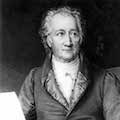From Felix Schafer to Ilona Duczyńska (16 September 1974)
The first section of the part I am now working on is "Philosophical Problems". The section begins with a mention of Michael Polanyi and Gomperz. Karl often spoke of methodological discussions with his brother. What it was about, I cannot say. But the fact of the discussions should be recorded. Gomperz came once while I was with you. In a conversation with Karl he criticized Kelsen for not considering sociology as a social science but as a natural science. Nene mentioned him to me as a friend of the family, and once in 1934 she spoke about the injustice that Gomperz was doing through his forced retirement.
After Gomperz I come to Popper and Zeisel. I would like to say the following about Popper (I will only mention the main points here): in a brief account of his career, I notice, among other things, that he helped Refugees - I include myself here - as much as he could in New Zealand. (He went to Nash, the minister responsible for entry permits at the time, at your request). Karl strong influence on Popper in his formative years is certain. Evidence is provided by the two posts in the "Open Society", where he mentions principles to which Karl drew his attention. That was 1924 and 1925. Karl does not appear in Popper's other books, although they deal with problems that he probably discussed with Karl because they are related to both of the mentioned passages.
About the "Open Society" I would like to say: I consider Popper's attempt to derive the political demand for "piecemeal engineering" from his philosophy to be unsuccessful. His criticism of Marx is of little importance, because he does not give much weight to the essential in Marxism, because he says that Marxists emphasize action as important. In general, I would like to say that, unlike Popper's other two books, "Open Society" has strong political connotations and, compared to Popper's earlier years, represents a shift from socialism to liberalism. Popper does not seem to have understood that liberalism leads to fascism as a result of the unsustainability of the market economy, i.e. precisely that which Popper rejects, and that when the market economy is threatened, i.e. profit, the liberals accept fascism as their salvation. - Without referring to you or to anyone else, I notice that Karl would probably have agreed with what I say about Popper.
What I don't want to say, because it can't be proven and therefore weakens the argumentation - "you don't get anything out of it" Karl once said to me - are what you call "subjective viewpoints". I also reject the "Open Society" for reasons which, as you say, have a "deep ideological basis". The "basis" is that he has come too close to Hayek. For example, he dedicated one of his books to him, which is regrettable when you think of Popper's earlier attitude.
After Popper, I'm going to write about Zeisel. Also with him I start with a short presentation of his career. At least 1924 and 1925 he seemed interested in philosophical questions. At that time he also recommended to me the study of such questions. Karl certainly encouraged him in his interest in concrete problems like surveys. I mention the one he wrote about Karl in the Encyclopaedia, which concentrated mainly on the anthropological works of Karl. This concludes the section.
I would like to hear what you think about what I intend to write about Popper. If there's anything you think is too much or not enough to say, etc., let me know. You can leave everything out, too.
Letter Information
Original Publication: Von Felix Schafer bis Ilona Duczyńska (16. September 1974)
KPA: 58/11, 100-101

